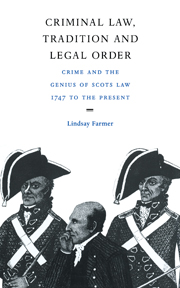Book contents
- Frontmatter
- Contents
- Acknowledgements
- 1 The boundaries of the criminal law: criminal law, legal theory and history
- 2 The genius of our law: legality and the Scottish legal tradition
- 3 The judicial establishment: the transformation of criminal jurisdiction 1747–1908
- 4 The ‘well-governed realm’: crime and legal order 1747–1908
- 5 The perfect crime: homicide and the criminal law
- 6 Conclusion: crime and the genius of Scots law
- Bibliography
- Index
2 - The genius of our law: legality and the Scottish legal tradition
Published online by Cambridge University Press: 08 January 2010
- Frontmatter
- Contents
- Acknowledgements
- 1 The boundaries of the criminal law: criminal law, legal theory and history
- 2 The genius of our law: legality and the Scottish legal tradition
- 3 The judicial establishment: the transformation of criminal jurisdiction 1747–1908
- 4 The ‘well-governed realm’: crime and legal order 1747–1908
- 5 The perfect crime: homicide and the criminal law
- 6 Conclusion: crime and the genius of Scots law
- Bibliography
- Index
Summary
Introduction
A condition of the Treaty of Union between Scotland and England in 1707 was that the Scottish legal system, together with the education system and the church, should remain separate administrative entities. The British state was thereby created. The study of Scots law is impossible without some awareness of this fact. This is not only because of the curious institutional arrangement to which the Union gave rise: the Scottish legal system exists without its own legislative body and the British Parliament passes laws that may be administered differently within the same country. It is essential because an awareness of this difference pervades every area and every aspect of writing, speaking and thinking about the law in Scotland. It has been central to the development of Scottish legal culture and, to a lesser extent, a Scottish national identity. Whatever our feelings about nationalism in general, and Scottish nationalism in particular, this circumstance cannot be ignored. Consequently any discussion of criminal jurisdiction, although apparently technical in character, begins at and continually returns to this point.
The Scottish criminal law has been shaped by its determination to remain independent from its English neighbour. In other areas of the law the practical consequences of the separate systems diminished under the weight of economic and administrative pressures, and as legislation revised or replaced much of the common law. Not so with the criminal law. The more serious offences are still to be found in common law, not statute. There has been stubborn resistance to the idea of codifying the substantive law.
- Type
- Chapter
- Information
- Criminal Law, Tradition and Legal OrderCrime and the Genius of Scots Law, 1747 to the Present, pp. 21 - 56Publisher: Cambridge University PressPrint publication year: 1996



